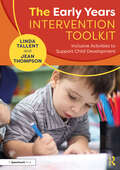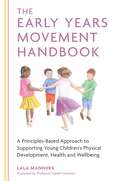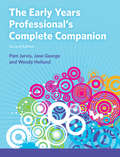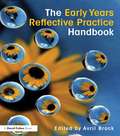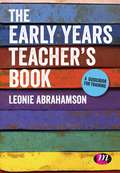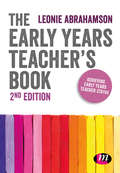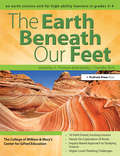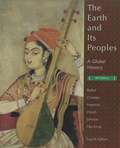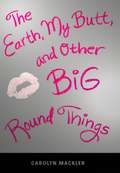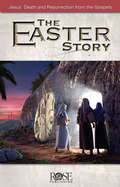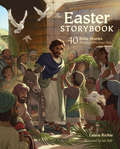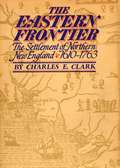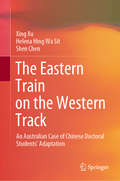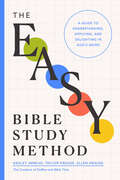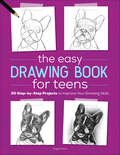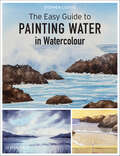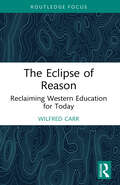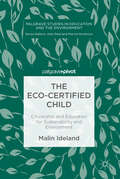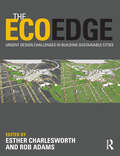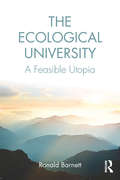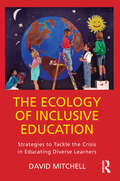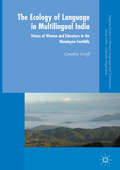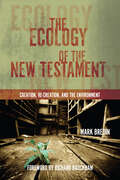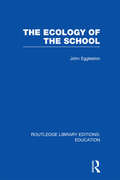- Table View
- List View
The Early Years Intervention Toolkit: Inclusive Activities to Support Child Development
by Jean Thompson Linda TallentThe Early Years Intervention Toolkit provides a range of ready-made activities to enable early years practitioners and health visitors to address observed difficulties in a child’s development prior to starting school. It includes a checklist of observed behaviours which links to a range of effective and engaging activities to support children’s development across the three prime foundational areas of learning: Communication and Language; Physical Development; and Personal, Social and Emotional Development. Activities focus on a variety of crucial skills such as speaking and listening, moving and handling, and forming relationships, making use of materials that are readily available in every early years setting. This toolkit offers: A time-saving approach to interventions, with additional guidance on planning, providing, and recording appropriate interventions Advice and activities to share with parents for them to try at home A framework to enable early years practitioners to identify specific difficulties in key areas of development Downloadable resources to support activities and interventions The Early Years Intervention Toolkit is an inclusive programme and all children in the early years will benefit from taking part in the activities. It will be an essential resource for early years practitioners to effectively identify and support learning needs in child development and will boost the confidence of young children as they prepare for Key Stage One.
The Early Years Movement Handbook: A Principles-Based Approach to Supporting Young Children’s Physical Development, Health and Wellbeing
by Lala MannersA Principles-Based Approach to Supporting Young Children’s Physical Development, Health and Wellbeing
The Early Years Professional's Complete Companion 2nd edn
by Jane George Pam Jarvis Wendy HollandFully updated to reflect the changes to the Early Years Professional Status (EYPS) qualification, this second edition remains the essential handbook to support all those considering or working towards EYPS and on whichever pathway they embark. Organised into three parts, the text starts by leading you through the initial requirements for entry to the programme, providing an overview of the different pathways. It goes on to focus on the standards against which all EYP candidates are tested, and then finally looks at the new validation process and beyond. Although closely linked to the standards required for EYPS, and their relationship with the Early Years Foundation Stage, the book is not a standard-by-standard manual; it supports you in developing an organic, holistic perspective on childcare and education, combining practical skills with knowledge development. The text includes case studies based on real practice scenarios, ideas for practical activities, further reading, reflection, interviews and advice from EYPS candidates who have successfully negotiated the validation process.
The Early Years Reflective Practice Handbook
by Avril BrockWhat do early childhood practitioners need to know about reflection and reflective practice? Ongoing reforms in early childhood care and education social policy affect all aspects of young children’s and their families’ lives. Decisions are being undertaken at a rapid pace and there is a need for those working in the field of Early Years to consolidate and reflect on their knowledge and practice, building on what they already know. This timely new book aims to support reflective practice for those working with young children in everyday work and in the wider political context, whatever their professional role and whatever level of qualification they hold. It takes a fresh look at a breadth of issues relating to early childhood care and education reflecting on policy, knowledge and practice. Incorporating practical reflection activities, case studies, exemplar scenarios and questions in each chapter the book considers: policy developments and how these have affected young children and their families issues around socio-culturalism, language, ethnicity, disposition, gender, inclusion and socio-economics when working with families learning through play and the notions of quality, observation and assessment and continuity contemporary issues that practitioners and students on placement may encounter in their everyday work deepening reflective thinking and practice through ongoing and continuing professional development. ? With practical guidance to help the reader reflect on their own practice, this text offers invaluable support to early years practitioners looking to develop their career and achieving higher qualification at both undergraduate and at Master’s level. The book is a must for students on early years courses including early childhood studies, initial teacher training and early years teacher status.
The Early Years Teacher's Book: Achieving Early Years Teacher Status
by Leonie AbrahamsonIf you are an Early Years Teacher Trainee, this book is written for you. It will help you to successfully achieve your Early Years Teacher Status and practice with confidence. This book guides you through what you need to know about Early Years Teacher Status step-by-step. It explains how you can work to meet each of the Standards and assessment requirements. The author addresses trainees' common concerns about early years practice, study skills and meeting EYTS requirements, as well as giving many examples of the strategies that trainees found most helpful. The chapters explore each aspect of every Standard and indicator, with notes on theory, practical tips, case studies, activities and suggestions for further reading. This book helps you to: * understand all aspects of each Standard and indicator; * link your practice to the Standards; * understand the assessment requirements and how to strengthen your evidence; * plan and track your evidence; * complete your written assignments and create your portfolio with confidence; * develop the skills needed to take on a leadership role. This book also provides support for the mentor-mentee relationship and includes guidance for mentors, teaching activities for tutors and support for assessors. This book is a valuable resource for all those involved in EYTS and will be useful for: - EYTS trainees - their mentors - their placement tutors - course lecturers - EYTS assessors
The Early Years Teacher's Book: Achieving Early Years Teacher Status
by Leonie AbrahamsonThis book guides you through what you need to know about Early Years Teacher Status step by step. It explains how you can work to meet each of the Standards and assessment requirements. The author addresses trainees’ common concerns about early years practice and study skills and meeting EYTS requirements and gives many examples of the strategies that trainees found most helpful. Each chapter explores each aspect of every Standard and indicator, with notes on theory, practical tips, case studies, activities and suggestions for further reading. This book helps you to: • understand all aspects of each Standard and indicator • link your practice to the Standards • understand the assessment requirements and how to strengthen your evidence • plan and track your evidence • complete your written assignments and create your portfolio with confidence • develop the skills needed to take on a leadership role This Second Edition has been updated to include new guidance on Standard 7 around the Prevent Agenda and the work of Channel. The text is also updated to include information on the 'Integrated review' at age 2.
The Early Years Teacher's Book: Achieving Early Years Teacher Status
by Leonie AbrahamsonThis book guides you through what you need to know about Early Years Teacher Status step by step. It explains how you can work to meet each of the Standards and assessment requirements. The author addresses trainees’ common concerns about early years practice and study skills and meeting EYTS requirements and gives many examples of the strategies that trainees found most helpful. Each chapter explores each aspect of every Standard and indicator, with notes on theory, practical tips, case studies, activities and suggestions for further reading. This book helps you to: • understand all aspects of each Standard and indicator • link your practice to the Standards • understand the assessment requirements and how to strengthen your evidence • plan and track your evidence • complete your written assignments and create your portfolio with confidence • develop the skills needed to take on a leadership role This Second Edition has been updated to include new guidance on Standard 7 around the Prevent Agenda and the work of Channel. The text is also updated to include information on the 'Integrated review' at age 2.
The Earth Beneath Our Feet: An Earth Science Unit for High-Ability Learners in Grades 3-4
by Clg Of William And Mary/Ctr Gift EdChildren are fascinated by rocks. They enjoy digging in the ground and take pleasure in finding rocks of various types. The Earth Beneath Our Feet, an Earth science unit for high-ability third and fourth graders, builds on the excitement that students have by engaging them in hands-on scientific investigations about rocks. Students begin to explore and understand the major components of rocks, the rock cycle, and the important uses of rocks. The unit works to expand the students' content knowledge by including information about weathering and the impact that various natural and man-made processes have on the ground they walk on.Grades 3-4
The Earth and Its Peoples: A Global History
by Daniel R. Headrick Pamela Kyle Crossley Richard W. Bulliet Lyman L. Johnson David Northrup Steven W. HirschAlthough this brief edition is two-thirds the length of its full-length counterpart, it retains coverage of all major themes and provides a truly global perspective on world history, without over-emphasizing Europe or the U. S. The Earth and Its Peoples focuses on the interaction of human beings and the environment, using this central theme to compare different times, places, and societies. Special emphasis is given to technology and how technological development underlies all human activity. Ideal for one-semester survey courses or courses for which instructors want to supplement their textbook with many primary sources, this text has been carefully abbreviated to maintain the essential narrative of world history. Key pedagogical elements have also been retained.
The Earth, My Butt and Other Big Round Things
by Carolyn MacklerFeeling like she does not fit in with the other members of her family, who are all thin, brilliant, and good-looking, Virginia tries to deal with her self-image, her first physical relationship, and her disillusionment with the people closest to her.
The Easter Story
by Rose PublishingThe Easter Story“I am a historian, I am not a believer, but I must confess as a historian that this penniless preacher from Nazareth is irrevocably the very center of history. Jesus Christ is easily the most dominant figure in all history.” —H.G. WellsThe Easter Story tells the most dramatic story in history. This ebook is drawn directly from the Gospels of Matthew and Luke and tells the story of Jesus from the Last Supper and Prayer in the Garden of Gethsemane, to the Crucifixion, Resurrection, and Ascension — in 14 full-color pages.This beautiful ebook includes—• The entire Easter story drawn directly from the Gospels• The Last Supper, Prayer in the Garden, Arrest of Jesus•Jesus tried by the High Priest, Pilate, and King Herod,•The passion of Christ, his death on the cross, burial, and Resurrection•The Road to Emmaus, the Great Commission and AscensionIt also includes a prayer of confession and belief in Christ.
The Easter Storybook: 40 Bible Stories Showing Who Jesus Is
by Laura RichieStarting with Jesus&’ time in the temple as a boy and ending with His appearances after the resurrection, The Easter Storybook invites readers into the big picture of God&’s love. Each of the 40 full-color, beautifully illustrated stories includes a Bible passage and a conversational question to guide families through the Easter season together. Unlike other children&’s Easter books, The Easter Storybook focuses not just on Jesus&’ last days but on the journey of His whole life leading to the joy of Easter morning. Every story will give children a glimpse into Jesus&’ identity—as Teacher, Good Shepherd, Savior, and King—making this a rich book to read throughout the year.The Easter Storybook explains who Jesus is, what He did, and why His death and resurrection matter, in a simple way that children ages 4–8 can understand and remember. As a fitting companion to the bestselling The Advent Storybook, this book is a wonderful way to discover as a family why Jesus came to earth as Rescuer, Redeemer, and Friend.
The Eastern Frontier: The Settlement Of Northern New England, 1610-1763
by Charles ClarkThis extremely readable account of early New England settlements emphasizes the development of a distinctive culture derived from the varied groups that settled there.
The Eastern Train on the Western Track: An Australian Case of Chinese Doctoral Students’ Adaptation
by Xing Xu Shen Chen Helena Hing SitThis book makes valuable theoretical, empirical, and methodological contributions to the study of overseas doctoral students’ cross-cultural adaptation. Focusing on Australia, one of the top three destinations for Chinese students, this book seeks to understand how Chinese doctoral students perceive their lived experience of adapting to the academic and research environment at Australian universities. The book presents an innovative data collection chiefly based on interviews. It probes into Chinese doctoral students’ emic perception of their cross-cultural adaptation from a human development perspective and in three main phrases: how motivated and prepared they are for their overseas stay (planning), how they experience their adaptation as active agents (implementing), and how they evaluate their overseas doctoral journey after the fact (reflecting). Empirically speaking, its findings can help bolster the effectiveness of cross-cultural adaptation and that of the internationalisation of doctoral education. Methodologically speaking, it combines popular techniques and underused instruments such as graphics and maps to offer an in-depth portrait of the issue. Given its content, the book is primarily intended for researchers in cultural studies and practitioners in international education, or in a broader sense for anyone who has a keen interest in how individuals navigate the learning trajectory and construe meanings in unfamiliar academic and socio-cultural settings. Though the book focuses on Australia as a case study, its findings are equally applicable to other contexts.
The Easy Bible Study Method: A Guide to Understanding, Applying, and Delighting in God's Word
by Ellen Krause Ashley Armijo Taylor KrauseBible study doesn&’t have to be confusing—it just needs a simple method.If you've ever opened your Bible and thought, "Where do I even start?" you're not alone. Maybe you long to grow closer to God, but you get tripped up by unfamiliar names and ancient customs. Maybe you wonder how any of this applies to your life today.The Coffee and Bible Time team—Ashley, Taylor, and Ellen—have been there.Ashley (co-author) remembers sitting in church and realizing she didn't truly understand the Bible like she thought she should. That moment sparked a deep desire to know God personally through His Word. It completely transformed her life and led to the inspiration behind this book.Ashley, Taylor, and Ellen (aka Mentor Mama)—love Jesus and long to know Him more deeply. Over the past 10 years, they&’ve helped more than two million women build a Bible study routine that&’s simple, consistent, and life-giving.That&’s why they&’ve created The Easy Bible Study Method — a practical, approachable Bible study workbook for women that teaches us how to study the Bible with confidence and clarity.Their simple E.A.S.Y. framework:E - Enter the storyA - Assess the main ideaS - Seek God and His characterY - Yearn for a heart change and deeper intimacy with ChristYou'll build a meaningful daily quiet time that fits your busy life and encourages spiritual growth.This Christian devotional workbook is perfect for personal study, small groups, or discipleship settings.Stop feeling stuck. Start encountering God.If you're ready to understand God's Word and let it transform your life, this method will become your roadmap to deeper faith.
The Easy Drawing Book for Teens: 20 Step-by-Step Projects to Improve Your Drawing Skills
by Angela RizzaElevate your drawing skills with this easy guide for teensAre you a budding artist who wants to take your artwork to the next level? This book is everything drawing books for teens should be, providing the tools and techniques to tackle 20 detailed drawings—from start to finish—in just 8 simple steps.Practice basic and next-level drawing skills such as shading, proportion, and adding fine details. Sketch your way through easy, step-by-step lessons with drawing projects ranging from modern still life to detailed portraits and finally photorealistic drawings. Find artist tips and prompts to help spark your imagination, discover your own personal style, and capture the world around you.Fundamentals of drawing—Build your art skills with tutorials on shading, proportion, finishing techniques, coloring, and more.Awesome art projects—From a Colorful Dragon to a Crawling 3D Spider, wow your friends with 20 fun and elaborate projects you won't find in other drawing books for teens.Space to create—Find inspiration for your own drawings with engaging prompts and plenty of blank pages just waiting to be filled with your creativity.If you're looking for drawing books for teens but aren't sure where to start, this easy guide will help any budding artist bring their drawings to life.
The Easy Guide to Painting Water in Watercolour
by Stephen CoatesThe ultimate no-nonsense guide to painting realistic, captivating water, from still lakes and crashing waves to water droplets.
The Eclipse of Reason: Reclaiming Western Education for Today (Routledge Research in Education)
by Wilfred CarrThis concise, digestible book shows how the cultivation of reason became the defining aim of western education, and critiques how this aim has been eclipsed in recent decades by the neoliberal system of mass schooling imposed by the state.Chapters outline succinctly the history of western education and its origins in Ancient Greece, demonstrating how the idea of education as intrinsically related to the development of reason became embedded in the Western educational tradition, and how this tradition subsequently developed and evolved. Introducing key philosophical ideas about the nature of education, the book shows how the development of mass schooling in the 19th century led to our current educational landscape, where neoliberal demands for schools to be more responsive to market forces have obscured the development of reason as a distinctive educational aim. By inviting educators to think reflectively and critically about the state of education today, the book raises the little-discussed educational question of what comes after neoliberalism.Calling for the re-establishment of western education’s core values and aims, this book will be of interest to educators, researchers and students involved with pre- and in-service teacher education courses, as well as those interested in the history of education and the philosophy of education more broadly.
The Eco-Certified Child: Citizenship and Education for Sustainability and Environment (Palgrave Studies in Education and the Environment)
by Malin IdelandWhile few could dispute the need for Environmental and Sustainability Education (ESE) for children and young people, this book explores the problems inherent in this educational practice. Despite good intentions, the author highlights how ESE can in fact contribute to a (re)production of harmful norms and possible subjectivities by categorizing various groups as ‘threats’ to the environment. The author analyzes how these categorizations are entangled in historical discourses on social class, nationality and race, thus resulting in double gestures of inclusion and exclusion. Even as sustainability and environmental engagement becomes a treasured identity for the affluent, the author highlights that despite the best of intentions, the discourse of ESE can reinforce positions of suborder and superiority, which could even impede real change in the long run. This illuminating book will be of interest to students, scholars and practitioners of sustainability education.
The EcoEdge: Urgent Design Challenges in Building Sustainable Cities
by Esther Charlesworth Rob AdamsPresenting diverse case studies of contemporary sustainable urban practice from Europe, Africa, India, South America, the USA and Australia, this book offers the reader a fantastic wealth of practical material from a range of internationally renowned authors. Each practical case study has addressed issues and then offered solutions to implement sustainable cities across a range of urban scales and cultures. Urgent design challenges explored include population density, recreating infrastructure that supports carbon neutral or low carbon (emission) intensive urban activities, and retrofitting for sustainability. Highly illustrated, thematically focused and with superb global coverage, this book presents a multi-voiced and yet highly cohesive reference for anyone interested in green issues in urban design and architecture.
The Ecological University: A Feasible Utopia
by Ronald BarnettUniversities continue to expand, bringing considerable debate about their purposes and relationship to the world. In The Ecological University, Ronald Barnett argues that universities are short of their potential and responsibilities in an ever-changing and challenging environment. This book centres on the idea that the expansion of higher education has opened new spaces and possibilities. The university is interconnected with a number of ecosystems: knowledge, social institutions, persons, the economy, learning, culture and the natural environment. These seven ecosystems of the university are all fragile and in order to advance and develop them universities need to engage with each one. By looking at matters such as the challenges of learning, professional life and research and inquiry, this book outlines just what it could mean for higher education institutions to understand and realize themselves as exemplars of the ecological university. With bold and original insights and practical principles for development, this radical and transformative book is essential reading for university leaders and administrators, academics, students, and all interested in the future of the university.
The Ecology of Inclusive Education: Strategies to Tackle the Crisis in Educating Diverse Learners
by David MitchellEducators today face two major challenges. The first, is to develop an education system which meets the needs of an ever more diverse student population. The second, is to successfully implement such a system. This requires nothing less than a revolutionary transformation of current approaches taken to education. Drawing on research-based evidence and offering over 70 concrete strategies to help educators respond to these challenges, this unique book provides a blueprint for an education system which will recognize the rights of all students, while engendering social cohesion and an equitable society. Broadening the scope of inclusive education, the author presents an ecological model – a system which places children at its centre and acknowledges the impacts of school, community, bureaucracy and society, to maximize opportunities for learning, and see students achieve the same levels of attainment, regardless of their gender, socio-economic status, ethnicity, religious beliefs or disability. A timely book which addresses the concerns of teachers and educators around the globe, The Ecology of Inclusive Education will give its readers the knowledge and confidence they require to meet the needs of each and every learner.
The Ecology of Language in Multilingual India: Voices of Women and Educators in the Himalayan Foothills (Palgrave Studies in Minority Languages and Communities)
by Cynthia GroffThis book explores the linguistic ecology of the Kumaun region of Uttarakhand, India through the experiences and discourses of minority youth and their educators. Providing in-depth examples of Indian multilingualism, this volume analyses how each language is valued in its own context; how national-level policies are appropriated and contested in local discourses; and how language and culture influence educational opportunities and identity negotiation for Kumauni young women. In doing so, the author examines how students and educators navigate a multilingual society with similarly diverse classroom practices. She simultaneously critiques the language and education system in modern India and highlights alternative perspectives on empowerment through the lens of a unique Gandhian educational context. This volume allows Kumauni women and their educators to take centre stage, and provides a thoughtful and nuanced insight into their minority language environment. This unique book is sure to appeal to students and scholars of multilingualism, sociolinguistics, language policy and minority languages.
The Ecology of the New Testament: Creation, Re-Creation, and the Environment
by Mark BredinGod is the Creator of all and cares deeply for all that he has made. His vision for creation is seen through a world teeming with life where eternity is breathed into and through all creation. Jesus teaches that humans must live with a spirit of generosity and restraint; however, a spirit of meanness and greed dominates human culture and leaves nearly 1.3 billion people living on less than $1 a day. The politics of globalization based on principles of greed have resulted in the loss of biodiversity, deforestation, and a shortage of food and clean water. Jesus teaches that those who are generous are blessed, and such generosity brings justice to all creation. There cannot be God's social justice without ecological sanity, and yet we tend to speak of social justice as though non-human creation doesn't matter. God cares even for the flowers of the field, yet we show contempt for God in our careless plunder of his creation. To love God is to love all that he has made, from our own families to the soil outside our homes.
The Ecology of the School (Routledge Library Editions: Education)
by John EgglestonWithin a single educational system – that of England and Wales – the nature of schooling available to a child can be dramatically different. Even between residential areas the differences in educational climate can be striking. Apart from differences in the organization of schools and the availability of buildings, teachers and resources, there are also significant ideological variations between local education authorities. This book considers the evidence of such differences, some of the environmental factors (political, social and economic) that may account for their distribution, and the consequences that appear to spring from them.
